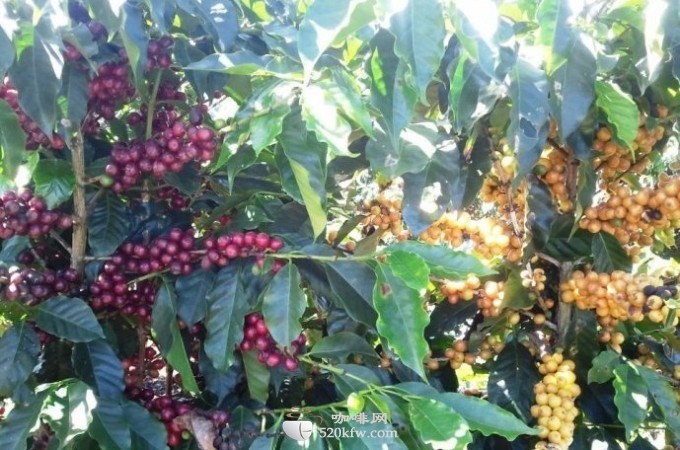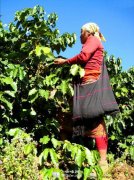The History of Coffee in China

According to historical data, Taiwan's cultivation was successful for the first time in 1884. Coffee trees were planted in China, and coffee cultivation on the continent began in Yunnan. In 1902, a French missionary named Tian introduced seeds in Yingong, a tributary of the Jinsha River in Binchuan County, Yunnan Province. it was successfully planted in a place called Zhu Kula, which is located on the bank of the Yuyujiang River, a tributary of the Jinsha River.
The commercial cultivation of coffee in Yunnan began in 1985, but its growth is slow. In 1995, the Yunnan provincial government formally put Yunnan coffee cultivation into the "18th" project, and coffee cultivation has grown rapidly, and now it has become the only high-quality coffee raw material base in China, accounting for 95% of the country's total output.
In 1884, coffee was successfully grown in Taiwan.
In 1902, coffee was successfully introduced and planted in Binchuan, Yunnan, China.
In 1985, Yunnan agricultural reclamation began the commercial cultivation of coffee.
In 1992, UNDP assisted China to build its first modern coffee processing plant.
In 1995, coffee wealth was included in the Yunnan biological capital development innovation project.
In 2003, Yunnan became the only high-quality coffee raw material base in China.
In China, people like drinking coffee more and more. The ensuing "coffee culture" is full of every moment of life. Whether at home, in the office, or in all kinds of social places, people are tasting coffee: its fashionable boudoir and modern life have become a good place for people to talk, listen to music and rest. Coffee has gradually grown into a culture. Whether it is rusty ground coffee beans, or just good hot coffee, are wearing a parrot fragrance, immersive. There are many ways to savor this immersion: espresso, Cabochiton, Latay, and flavored coffee; they provide a variety of options for people in Beijing, Shangjiu and other big cities in China who often help with coffee shops. Chinese people also gradually like to make their own coffee. It also has a different taste to make a novel cup of coffee with roasted coffee beans, filtration pots and filter paper.
As coffee is widely known as a drink with a long history, coffee is being taken over by more and more Chinese people. According to rare data, China's coffee consumption is increasing year by year, and is expected to become a major coffee consumer in the world. Today, Yunnan coffee, produced in China's own land, with its noble quality and low price, will urge this trend, guide this fashion, and become the Chinese people's own coffee brand, with China's own weird coffee culture.
Important Notice :
前街咖啡 FrontStreet Coffee has moved to new addredd:
FrontStreet Coffee Address: 315,Donghua East Road,GuangZhou
Tel:020 38364473
- Prev

Introduction to the production areas of high-quality coffee beans in Ethiopia
Across the Red Sea and opposite Yemen, Ethiopia is the first place in the world to find coffee trees in Arabica, where coffee is grown almost everywhere in the country. Among them, the eastern Highland Hara (Harra) produces the famous Haramoka, which has a special wine aroma and acidity, which is equivalent to the Yemeni mocha and is a high-quality coffee. So are Sidamo and Djimmah in the south.
- Next

High-quality coffee common sense coffee tree classification selection
Arabica Coffee and Variety improvement. What do the so-called families, genera and species of Arabica species mean in biological classification? In terms of biological classification, it is divided into boundary, phylum, class, order, family, genus and species from top to bottom, and the lower part of the species is subdivided into subspecies, varieties and varieties. Arabica coffee is generally thought to originate from the Ethiopian plateau and is widely divided.
Related
- Beginners will see the "Coffee pull flower" guide!
- What is the difference between ice blog purified milk and ordinary milk coffee?
- Why is the Philippines the largest producer of crops in Liberia?
- For coffee extraction, should the fine powder be retained?
- How does extracted espresso fill pressed powder? How much strength does it take to press the powder?
- How to make jasmine cold extract coffee? Is the jasmine + latte good?
- Will this little toy really make the coffee taste better? How does Lily Drip affect coffee extraction?
- Will the action of slapping the filter cup also affect coffee extraction?
- What's the difference between powder-to-water ratio and powder-to-liquid ratio?
- What is the Ethiopian local species? What does it have to do with Heirloom native species?

